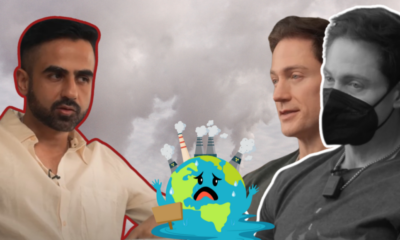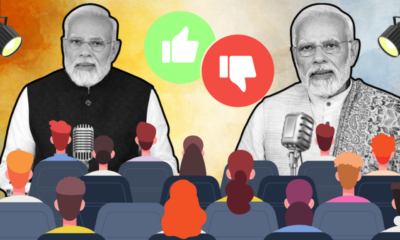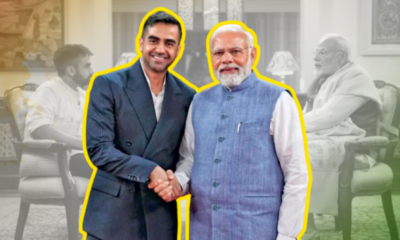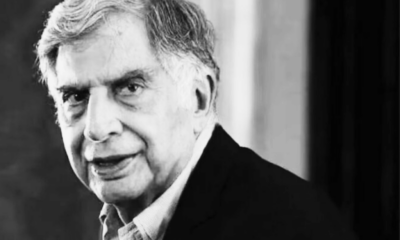Entertainment
Everything You Need to Know From Modi’s Chat with Nikhil Kamath
Explore our detailed review of the podcast's key insights and highlights, focusing on the most vital discussions and takeaways.
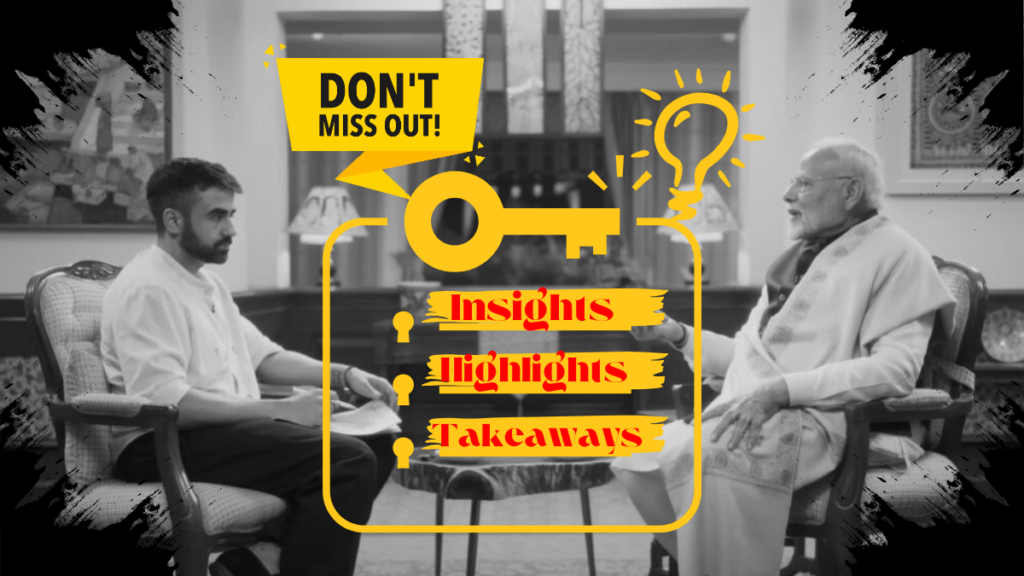
Prime Minister Narendra Modi, known for his knack for communication and outreach, recently made headlines by stepping into the podcasting realm. From his debut podcast appearance with Nikhil Kamath, co-founder of Zerodha, to speculations about an upcoming session with renowned podcaster Lex Fridman, Modi’s foray into this popular medium has sparked wide-ranging reactions. The move has ignited debates about the relevance of such appearances for a political leader, their potential impact, and the balance between genuine engagement and attention-seeking. This feature delves into the podcast debut of Narendra Modi with Nikhil Kamath, the reactions to his potential interaction with Lex Fridman, and the broader implications of these engagements.
Narendra Modi Podcast: A New Era of Political Communication
On January 10, 2025, Prime Minister Narendra Modi made headlines by appearing on Zerodha co-founder Nikhil Kamath’s podcast, People by WTF. The two-hour episode marked Modi’s first podcast appearance and offered a deep dive into his life, leadership philosophies, and India’s developmental trajectory.
PM Modi’s podcast appearance came as a surprise to many when he joined Nikhil Kamath on the latter’s show. Known for his sharp business insights and conversations with influential personalities, Kamath provided a platform for Modi to delve into his vision for India’s future. The conversation was candid and reflective and touched on several pivotal moments from Modi’s tenure, making it a significant cultural and political event.
Also Read: Modi’s Podcast is More Than Talk, But Why and Why Now?
Everything Important in the Podcast!
- Debut on Podcasting:
- Prime Minister Modi admitted that this was his first time engaging in a podcast format. He seemed enthusiastic to explore this relatively new medium.
- Reflections and Motto:
- Discussing his tenure as Gujarat’s Chief Minister, PM Modi recounted a speech where he emphasized his commitment to hard work and transparency of not doing anything for himself, stating, “I am human, mistakes can happen, but I won’t make mistakes with wrong intentions,” “I am human, not a God,” acknowledging his capacity for error. This rare moment of vulnerability and humility stood out as one of the podcast’s most discussed segments.
- 2002 Gujarat:
- Modi addressed how the 2002 elections were the biggest challenge of his life. He described the immediate aftermath of the Godhra train incident and how he had to navigate the crisis as Chief Minister.
- Politics as a Mission:
- The Prime Minister urged to view politics as a mission toward public service rather than “ambition” He emphasized the importance of empathy and commitment to social betterment. A mission should be above Ambition, the Prime Minister highlighted.
- Dealing with Failure and Success:
- The Prime Minister emphasises how the failure of Chandrayaan-2 was a significant setback for the country. But he did not let the failure deter him. He highlighted that he is not someone who will spend his life crying over a setback, and his words to the scientists evoke encouragement: “If there is a failure, then it is my responsibility. You attempted very well. Please don’t be disappointed.” He further adds, that he instilled as much self-confidence as he could in them. And also that Chandrayaan-3 was successful.
Advancements and Sentiment!
- India’s Technological Leap:
- Modi took pride in discussing India’s advancements in technology and innovation. From the digital payment revolution to India’s success in space exploration, underscoring how embracing technology has catalyzed growth and global recognition.
- Taking Risks
- In the podcast when Nikhil Kamath broached the subject of taking risks, the PM responded with clarity that he feels that his risk-taking capacity has not been fully utilised yet.
- His Mother’s Words
- In the podcast, Modi fondly remembers his mother’s words to him, “Work with intelligence, live with purity,” and expresses in a way the sentences were like a treasure to him.
- The 2047 Vision:
- He stressed a vision of a developed India by 2047. Throughout the interview. Benefits like toilets, electricity, and water for all were touched upon. He emphasised that all benefits should be accessible to everyone, 100 % delivery and 100 % benefits, without discrimination, and with true social justice—a concept he referred to as true secularism. He further said that its driving force is aspirational India. With AI standing for Aspirational India.
- Emphasis on Not Viewing Politics as a Dirty Game:
- Addressing India’s young population, Modi stressed the point that politics is not dirty.
There’s More! Keep Reading!
- Leadership Philosophy:
- Modi shared personal anecdotes about leadership, decision-making, and the challenges of steering the country during the pandemic.
- Faith in Youth
- Modi expressed a lot of faith in Youth in the podcast.
- Narendra Modi’s Message
- He encourages women to stand out with the qualities of leadership. Addressing the youth, he highlights that you shouldn’t restrict yourself to thinking that politics is all about elections. He emphasises the importance of experiencing the political sector and public life at least once. Join in any form. And today, the country needs leadership that stems from creativity.
- Finally, Narendra Modi states, “Now the country needs creativity; those who think creatively, those who make new things, those who prepare themselves, those who understand happiness and sorrow, those who find solutions—not those who humiliate others, those who find newer avenues for the country—the country needs this kind of community.”
- I wish for a new flow in all parties. They should come into all parties. That the youth should come forward, for a new beginning.
- Life Beyond Politics:
- Modi also shared a lighter side, reminiscing about his early life and his connection to simple joys, dining at restaurants, and sharing some laughs. His anecdotes added a personal touch, making the podcast more relatable to listeners.
Podcasts: A Good Move or Pure Optics?
Modi’s podcast appearances raise an important question: Should political leaders venture into informal, unfiltered platforms like podcasts?
Here’s a breakdown of both sides of the coin!
Advantages
- Direct Communication: Podcasts provide a platform for leaders to bypass traditional media filters and communicate directly with audiences.
- Humanising Leadership: Casual formats can help leaders appear more relatable and accessible.
- Engaging Younger Audiences: Platforms like podcasts are particularly popular among younger demographics, making them an effective tool for outreach.
Disadvantages
- Risk of Oversimplification: The conversational nature of podcasts may oversimplify complex issues, leading to criticisms of being superficial.
- Perceived Bias: Appearing on selective platforms can raise questions about impartiality and agenda-setting.
- Criticism of Prioritization: Some critics argue that focusing on podcasts may divert attention from pressing governance issues.
Also Read: PM Modi in his Podcast Debut with Nikhil Kamath: A Must-Watch!
The Broader Debate: Should Modi Continue Podcasts?
The question of whether political leaders should appear on podcasts is layered and complex. On one hand, podcasts offer an intimate medium for long-form, nuanced conversations that traditional media often lacks. For Modi, who already commands a strong presence across platforms, this new avenue reinforces his image as a leader in tune with the times.
However, sceptics argue that these appearances may prioritize optics over substance. If the discussions are overly sanitized, they risk coming across as mere publicity stunts rather than genuine engagements.

